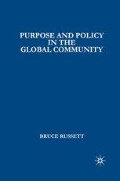Abstract
Most Islamic countries are governed by authoritarian regimes, and in most Islamic countries women’s economic, social, and political rights are significantly less than those of the men of their country. These well-known facts provide the basis for a highly original and important analysis by M. Steven Fish.1 Fish’s major contribution is his suggestion that the relationships at issue are not merely a matter of spurious correlation but rather are indicative of a deep underlying causal pattern. In a sophisticated cross-national quantitative analysis, he shows the following:
-
1.
Even controlling for many other alleged influences on countries’ political systems, countries with a largely Islamic religious tradition have significantly more autocratic governments than do non-Islamic countries.
-
2.
Controlling for level of economic development, the condition of women is significantly worse in Islamic countries than in others.
-
3.
In a more limited test, even when controlling for economic development and Islamic tradition, a low level of women’s rights may produce lower levels of democracy.
-
4.
More speculatively, Islamic states may be more autocratic so as to repress women’s rights more effectively, or autocratic government may permit and even require the repression of a range of human rights, including those of women.
Access this chapter
Tax calculation will be finalised at checkout
Purchases are for personal use only
Preview
Unable to display preview. Download preview PDF.
Notes
M. Steven Fish, “Islam and Authoritarianism,” World Politics 55 (October 2002), 4–37.
Kristian Skrede Gleditsch, All International Politics Is Local: The Diffusion of Conflict, Integration, and Democratization (Ann Arbor: University of Michigan Press, 2002)
Jon Pevehouse, Democracy from Above? Regional Organizations and Democratization (New York: Cambridge University Press, 2005).
See Hisham Sharabi, Neopatriarchy: A Theory of Distorted Change in Arab Society (Oxford: Oxford University Press, 1988)
Alfred Stepan, with Graeme Robertson, “An ‘Arab’ More Than ‘Muslim’ Electoral Gap?” Journal of Democracy 14 (July 2003), 30–44.
See Adam Przeworski, Jose Cheibub, and Fernando Limongi, “Culture and Democracy,” World Culture Report: Culture, Creativity and Market (Paris: UNESCO Publishing, 1998).
Copyright information
© 2006 Bruce Russett
About this chapter
Cite this chapter
Donno, D. (2006). Islam, Authoritarianism, and Female Empowerment: What Are the Linkages?. In: Purpose and Policy in the Global Community. Advances in Foreign Policy Analysis. Palgrave Macmillan, New York. https://doi.org/10.1007/978-1-137-10058-0_7
Download citation
DOI: https://doi.org/10.1007/978-1-137-10058-0_7
Publisher Name: Palgrave Macmillan, New York
Print ISBN: 978-1-4039-7184-5
Online ISBN: 978-1-137-10058-0
eBook Packages: Palgrave Political & Intern. Studies CollectionPolitical Science and International Studies (R0)

